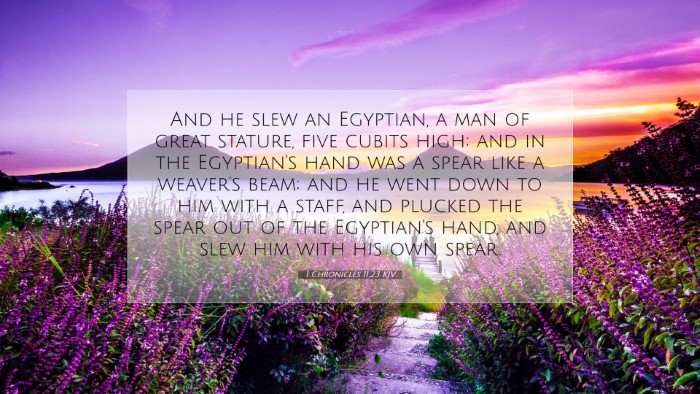Commentary on 1 Chronicles 11:23
Verse: 1 Chronicles 11:23 - "And he was more honorable than the thirty, but he attained not to the first three: and David set him over his guard." (KJV)
Introduction
This verse highlights one of David’s mighty warriors, Benaiah, a figure of heroism and valor, whose exploits earned him distinction in the history of Israel. The context of this passage is crucial for understanding its significance, as it reveals insights into leadership, honor, and the nature of true valor.
Contextual Analysis
The chapters in Chronicles recount significant events in the life of David and the establishment of his kingdom. The setting of this verse falls among the accounts of David's mighty men, illustrating the valor that was not simply based on physical prowess but on loyal service and devotion to their king.
Historical Context
Matthew Henry notes that these men were renowned for exceptional courage during a tumultuous time in Israel's history. Each warrior's deeds were recorded to inspire future generations and demonstrate the qualities of devotion, skill, and bravery required in the service of God’s anointed king.
Character of Benaiah
Benaiah's accomplishments were significant, including defeating a lion in a pit on a snowy day, and a formidable Egyptian warrior. Albert Barnes emphasizes Benaiah's ability to face formidable challenges, highlighting that true bravery often involves confronting fears and doubts.
Interpretative Insights
The verse speaks to the hierarchy among David's warriors and the nuances of honor. While Benaiah was distinguished among the thirty, he did not reach the esteemed rank of the first three. This presents an opportunity to discuss the meritocracy of valor versus divine election in God’s kingdom.
Divine Sovereignty
Adam Clarke comments that this reflects God’s sovereign choice among leaders and warriors. Although Benaiah did not rank among the first three, this does not diminish his worth or contributions. God’s assignment and recognition of individuals within His kingdom do not always align with human appraisal of success.
The Ninefold Role of a Leader
From this passage, we can derive valuable lessons for leadership and service in the church today:
- Courage: Benaiah’s bravery exemplifies the courage necessary for leaders who stand for truth and righteousness.
- Service: His role in David’s guard signifies that leadership often involves servitude and the protection of the community.
- Loyalty: Remaining faithful to one’s leader and the mission is a key aspect of Benaiah’s character.
- Skill Development: The training and honing of one's skills are essential. Benaiah showed that physical prowess and strategy are vital in battle.
- Valuing Others: While competition can exist, valuing the contributions of all members strengthens the collective.
- Humility: Despite being honorable, Benaiah did not seek to elevate himself above others.
- Encouragement: Encouraging others in their respective roles fosters unity and strength.
- Vision: Understanding God’s purpose for oneself and the church can lead to impactful leadership.
- Faith: Trusting God for strength and wisdom in all endeavors as demonstrated by Benaiah’s actions.
Conclusion
1 Chronicles 11:23 serves as more than merely a historical record; it encapsulates timeless principles of leadership, honor, and the dynamics of serving God’s kingdom. Matthew Henry remarks that Benaiah is an example to follow, illustrating the traits vital for anyone called to serve in any capacity within the church. As we reflect upon his life, we are reminded of our duty to aspire to these qualities in our own spheres of influence.
Application for Today’s Believers
In the modern church context, the implications of this verse resonate across denominations and communities. Leaders and congregants alike are called to exemplify the character of Benaiah—facing challenges with courage, serving selflessly, and valuing each member's contributions. Emulating Benaiah encourages a culture of honor and respect within our churches, fostering growth and unity.


